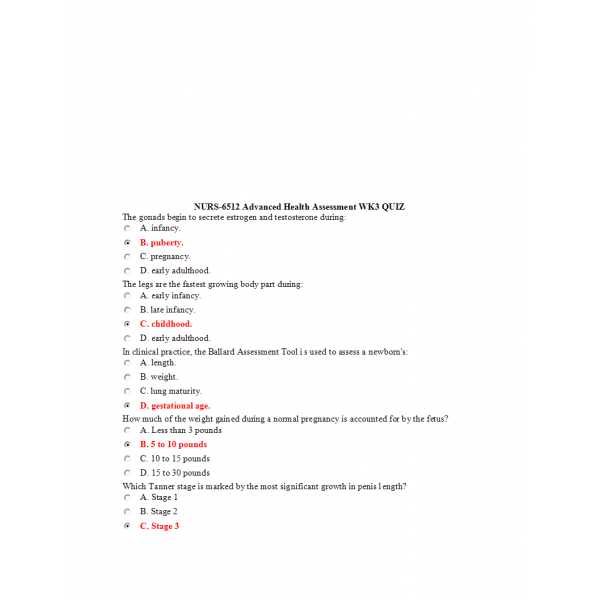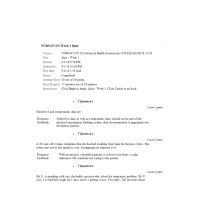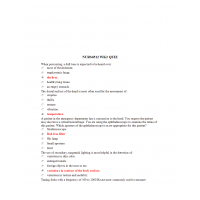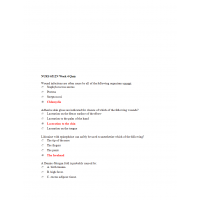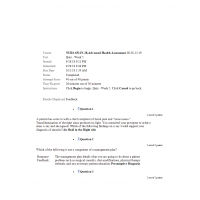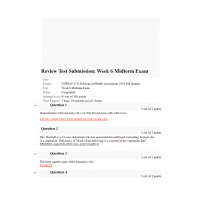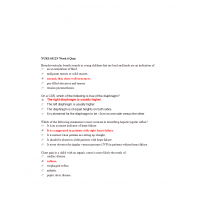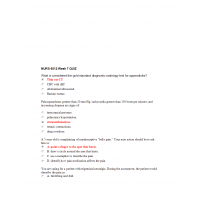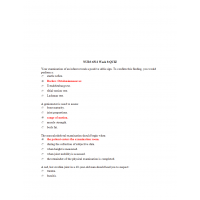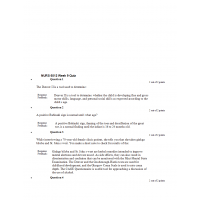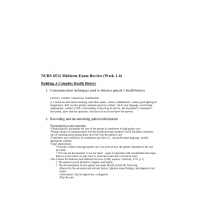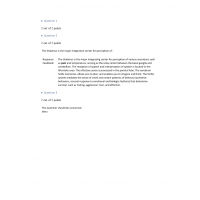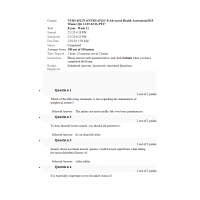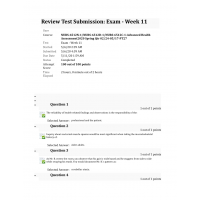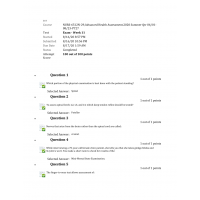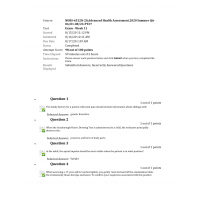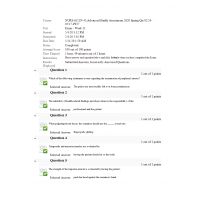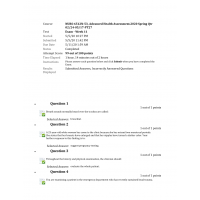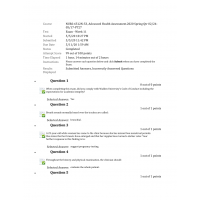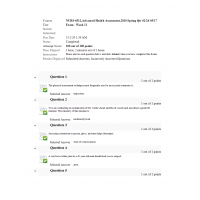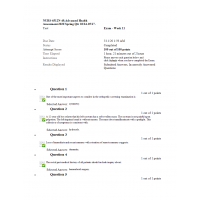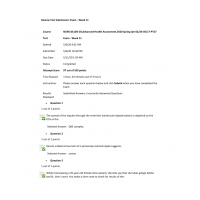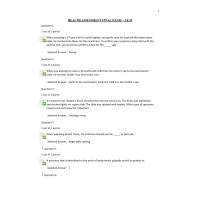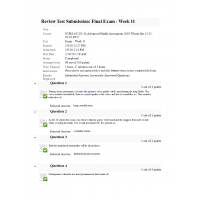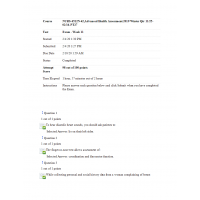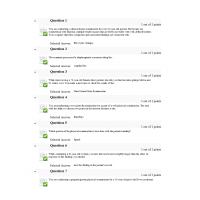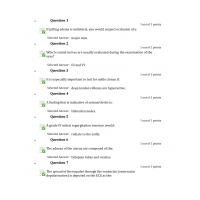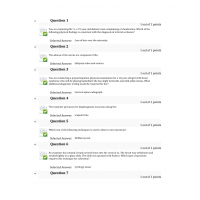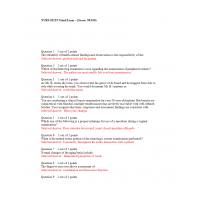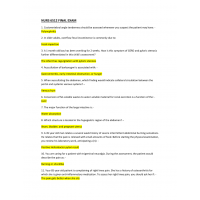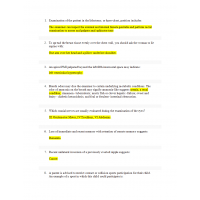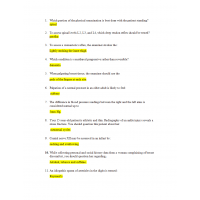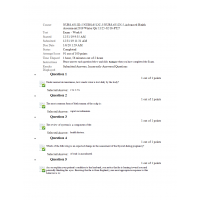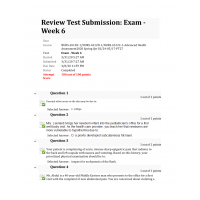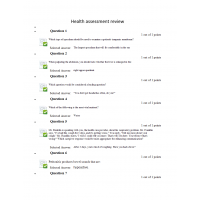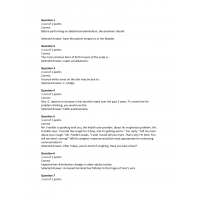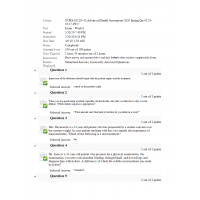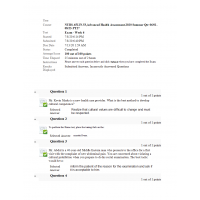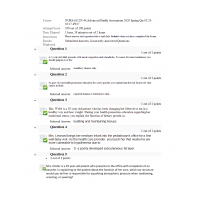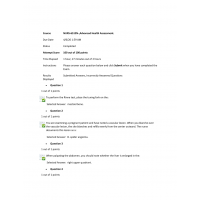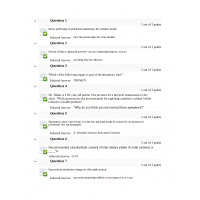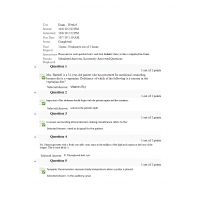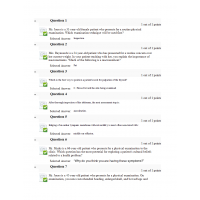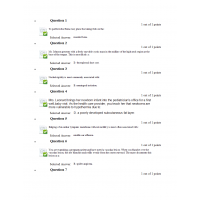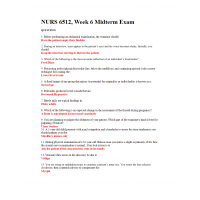NURS 6512N Week 3 Quiz with Answers (03 Sets)
NURS-6512 Advanced Health Assessment Week 3 QUIZ
1. The gonads begin to secrete estrogen and testosterone during:
2. The legs are the fastest growing body part during:
3. In clinical practice, the Ballard Assessment Tool is used to assess a newborn's:
4. How much of the weight gained during a normal pregnancy is accounted for by the fetus?
5. Which Tanner stage is marked by the most significant growth in penis length?
6. A 17-year-old girl presents to the clinic for a sport s physical. Physical examination findings reveal bradycardia, multiple erosions of tooth enamel, and scars on her knuckles. She appears healthy otherwise. You should ask her if she:
7. A deficiency of vitamin ___, a fat-soluble micronutrient, can result in rickets.
8. Allergies to drugs and foods are generally listed in which section of the medical record?
9. Regardless of the orifice, discharge is described by noting:
10. When recording assessments during the construction of the problem-oriented medical record, the examiner should:
11. Which of the following is a macronutrient?
12. You are using the rule of thumb for advising a 150-pound person regarding the appropriate number of calories to promote weight loss. Your advice is for the person to consume no more than _____ calories.
13. Which B vitamin is deficient in patients with pernicious anemia?
14. Your patient returns for a blood pressure check 2 weeks after a visit during which you performed a complete history and physical. This visit would be documented by creating a(n):
15. Which medication is frequently associated with weight gain?
16. Macronutrients are so named because they:
17. The recommended minimum daily protein requirement for the normal adult is:
18. Ms. G. is being seen for her routine physical examination. She is a college graduate and president of a research firm. Although her exact salary is unknown, she has adequate health insurance. Most of the above information is part of Ms. G. s _____ history.
19. What finding is unique to the documentation of a physical examination of an infant?
20. Which of the following should be assessed first in the patient with sustained rapid respirations?
NURS-6512N-28,Advanced Health Assessment
1. The gonads begin to secrete estrogen and testosterone during:
2. The legs are the fastest growing body part during:
3. In clinical practice, the Ballard Assessment Tool is used to assess a newborn's:
4. How much of the weight gained during a normal pregnancy is accounted for by the fetus?
5. Which Tanner stage is marked by the most significant growth in penis length?
6. A 17-year-old girl presents to the clinic for a sport s physical. Physical examination findings reveal bradycardia, multiple erosions of tooth enamel, and scars on her knuckles. She appears healthy otherwise. You should ask her if she:
7. A deficiency of vitamin ___, a fat-soluble micronutrient, can result in rickets.
8. Allergies to drugs and foods are generally listed in which section of the medical record?
9. Regardless of the orifice, discharge is described by noting:
10. When recording assessments during the construction of the problem-oriented medical record, the examiner should:
11. Which of the following is a macronutrient?
12. You are using the rule of thumb for advising a 150-pound person regarding the appropriate number of calories to promote weight loss. Your advice is for the person to consume no more than _____ calories.
13. Which B vitamin is deficient in patients with pernicious anemia?
14. Your patient returns for a blood pressure check 2 weeks after a visit during which you performed a complete history and physical. This visit would be documented by creating a(n):
15. Which medication is frequently associated with weight gain?
16. Macronutrients are so named because they:
17. The recommended minimum daily protein requirement for the normal adult is:
18. Ms. G. is being seen for her routine physical examination. She is a college graduate and president of a research firm. Although her exact salary is unknown, she has adequate health insurance. Most of the above information is part of Ms. G. s _____ history.
19. What finding is unique to the documentation of a physical examination of an infant?
20. Which of the following should be assessed first in the patient with sustained rapid respirations?
NURS 6512 Week 3 Quiz
1. If information is purposefully omitted from the record, you should
2. Which part of the information contained in the patient's record may be used in court?
3. During the course of the interview, you should
4. Ms. S reports that she is concerned about her loss of appetite. During the history, you learn that her last child recently moved out of her house to go to college. Rather than infer the cause of Ms. S's loss of appetite, it would be better to
5. Subjective and symptomatic data are
6. The quality of a symptom, such as pain, is subjective information that should be
7. Which of the following is an effective adjunct to document location of findings during recording of physical examinations?
8. The position on a clock, topographic notations, and anatomic landmarks
9. Regardless of the orifice, discharge is described by noting
10. Drawing of stick figures is most useful to
11. Which of the following is an example of a problem requiring recording on the patient's problem list?
12. A problem may be defined as anything that will require
13. Differential diagnoses belong in the
14. When recording assessments during the construction of the problem-oriented medical record, the examiner should
15. Which of the following is not a characteristic of the plan portion of the problem-oriented medical record?
16. Your patient returns for a blood pressure check 2 weeks after a visit during which you performed a complete history and physical examination. This visit would be documented by creating a(n)
17. A detailed description of the symptoms related to the chief complaint is presented in the
18. The effect of the chief concern on the patient's lifestyle is recorded in which section of the medical record?
19. The patient's perceived disabilities and functional limitations are recorded in the
past medical history.
20. The review of systems is a component of the
21. Allergies to drugs and foods are generally listed in which section of the medical record?
22. Ms. G is being seen for her routine physical examination. She is a college graduate and president of a research firm. Although her exact salary is unknown, she has adequate health insurance. Most of the above information is part of Ms. G's _____ history.
23. Objective data are usually recorded
24. Information recorded about an infant differs from that of an adult, mainly because of the infant's
25. In which section of the newborn history would you find details of gestational assessment and extrauterine adjustment data?
26. What finding is unique to the documentation of a physical examination of an infant?
27. Data relevant to the social history of older adults include information on
28. A SOAP note is used in which type of recording system?
29. Examiner's evaluation of a patient's mental status belongs in the
30. When recording physical findings, which data are recorded first for all systems?
31. Regarding another provider's documented work, it
32. Which of the following is true regarding the use of "copy and paste, carry forward" (CPCF) in an electronic medical record?
33. The OLD CHARTS mnemonic is a way of documenting which of the following?
| Institution & Term/Date | |
| Term/Date | Walden University |
-
$14.00
Related Products
Tags: nurs 6512n

